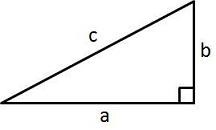One of my sisters writes poems about philosophy, and has even had one published. I was spurred by this to try to put some mathematics in rhyme, as that is more my line. So here is a first attempt, aimed at my ten-year old grandson, though maybe it's a bit early for him yet!
Now, Sam, you're old enough to learn A little more than graphs and sums; It's time to meet a 'theorem': Your first, I think, though more will come. "What is this thing?" I hear you say. I'd say it's universal truth: It shows how things will work always, And, what is more, comes with a proof. A special triangle's the core (Which I believe you've met before): With one side flat along the ground, Another side's straight up and down.

We call the biggest angle 'right', Because it gives the greatest height; So if the biggest angle's wrong, The sum below's not worth a song! They say the ancient Greeks found out The theorem this is about; Perhaps it was Pythagoras, But no-one's really sure of that. Do you remember what's a square? No, not the shape, the number pair: You times it by itself to get A number that is bigger yet. So square the length of every side And add the smallest to the next; The theorem says this, every time, Is equal to the one that's left. This longest side has got a name: It's called in books 'hypoteneuse'. (In case you think it's just the same, Not 'hippopotamus'!) Try this sum, if you are keen: The sides each measure three, four, five; Three squared is nine, and four sixteen, Which sum to five squared: twenty-five. Or try with thirteen, twelve and five, Which makes another shape that's right: One-four-four and twenty-five Make one-six-nine, so all is bright! And now the proof: you draw a square (This time the shape, not number-pair) Upon the long hypoteneuse Of any shape that's right to choose. Another square you now must draw Through that square's corners (yes, all four), And through the triangle's as well (Of which there's three, as you can tell). Four triangles surround the square, All like the one you deigned to choose; The area of this same square's The square of the hypoteneuse. Now you have to re-arrange The triangles, so they're in pairs; Look at the picture: it has changed So there are now two different squares. The area of one's the square Of one side of the shape you chose; The other too, so we are there: The two add up as we supposed.

When digging through many years of accumulated archives in our loft during lock-down, I came across an incomplete scrap of an idea from my University days. It seemed easy to complete, so here it is.
A girl who was very straight-laced
Determined no pleasure to taste;
She rejected tight-lipped
Till one day she tripped ...
She sometimes still dreams that she's chaste.
Rossall, April 1971, and Nefyn, November 2020
(rhyming with 'Farage') During the Brexit debates I was struck early on by how some of the key names seemed to correspond so well to the made-up names in Lewis Carroll's 'Jabberwocky'. One wet and windy Welsh winter day, I sat down to make what I could of it.
'Twas Brexit, and the smarmy Gove Did grin and gabble on the 'waves; All flimsy was the Boris-cove, And the Rees-Mogg did rave. "Beware the Jabberage, my maid! The mouth that spouts, the memes that catch! Beware the Trump, and long evade The truthless media-match!" She took her voting pen in hand, And long the tedious truth she sought, Till rested she on the day of deed, And sat awhile in thought. And as she pondered what had been, The Jabberage with bulging eyes Came waffling on the shining screen And burbled with his lies. Line up, across - no sense of loss: The voting pen inscribed her choice; She made no blot, she found the slot, And to her wish gave voice. "And hast thou shunned the Jabberage? Come to my arms, my thoughtful girl! O famous day! No Brexit Day! Now we can save the World!"Nefyn, December 2019, with apologies to Lewis Carroll
I was introduced to the Llangefni Over-50s Bilingual Eisteddfod when our local choir travelled to Anglesey to compete in it in 2015. (Alas, the series has now stopped, no doubt due to the effort required to stage the event.) There were lots of competitions for individuals as well, so I was inspired to enter some of them. One was for a Limerick starting with "On waking one day I had an urge".
On waking one day I had an urge
To rid us all of the terrible scourge
Of missing and misplaced punctuation,
Misleading and mystifying the nation:
We'll see a brave new world emerge.
Nefyn, August 2017, for the 2017 Llangefni Over-50s Bilingual Eisteddfod
I was fortunate enough to get a contract in 2016 to deliver a training course in the USA. On the flight out, in the comfort of business class, I settled down to address the list of competitions for the Llangefni Eisteddfod later in the year. I had already done a little research about one which required a short, light-hearted poem in the style of William Topaz McGonagall, to remind myself what his style was. I had also watched the Queen's 90th Jubilee Procession in London, as my wife was taking part on behalf of her charity, and McGonagall certainly seemed to like writing about the Queen. This was the result, which won the competition, and nearly won the Chair as well.
Congratulations to you, our queen, on your special day! I've travelled all the way to London so I could say Ninety years is a long time to do your duty, And I think you've done it well with grace and beauty. It's a pity the rain has chosen to fall on your parade, But we'll all smile through and in the end be glad we stayed. I see you're patron of many charities besides the one we know; In fact, you must be busy encouraging them to work and grow, Quite apart from your other work approving all our laws, Talking to the Prime Minister, and coping with your family's flaws. So let's put all that aside and raise a glass to cheer Your contributions to our country's culture in your ninetieth year.August 2016, for the 2016 Llangefni Over-50s Bilingual Eisteddfod
Here's another result of the flight to the USA.
A ruby gleam escapes your green glass prison, forerunner of the fruit whose juice began the slow and crafty journey to my store. Salute the careful labour in the vineyard and subtle science of water, grape and yeast that yields the heady essence trapped within! The time has come to free the caged aroma and hear the gurgle and the swirling splash: the heralds of your hedonistic taste.August 2016, for the 2016 Llangefni Over-50s Bilingual Eisteddfod
There was a competition in the 2016 Eisteddfod simply entitled "Lyric: Remember me". I took this to mean the lyrics for a potential song, so tried writing verses and a chorus that should fit easily to music (though I didn't try composing the music as well).

Chorus:
Remember me?
Lying on the beach, with my red shirt there to see?
I shocked the world!
This is the product of our inequality.
We fled the fighting in the country of my birth,
And made a life of sorts, with work of little worth;
But then my dad said we should travel 'cross the sea:
Remember me!
1. I used to play with my brother in the town:
That city full of jasmine, we used to call our own;
But then they started shooting, and my mum said we should flee:
Remember me!
2. We went to mummy's family, to wait the fighting out;
Instead, the bombers followed and we joined the general rout
To cross the nearby border and become a refugee:
Remember me!
3. Now we were poor, and we had not much to eat,
Without my auntie's help, we'd be living on the street;
So daddy made a plan for us all to go to sea:
Remember me!
4. The boat was very small and the sea was very rough,
The grown-ups tried to steer, but they didn't know enough;
We flipped completely over, and the waves took us, all three:
Remember me!
August 2016, for the 2016 Llangefni Over-50s Bilingual Eisteddfod
The Limerick competition in 2016 gave the first line "One day on my way to Pwllheli".
One day on my way to Pwllheli
I chanced to meet Lisa Minelli!
I asked for a song
As we ambled along,
But she answered me, "Not on your nelly!"
August 2016, for the 2016 Llangefni Over-50s Bilingual Eisteddfod
We visited Patagonia early in 2016, and our tour took us through Argentina to see some of the outposts of the Andes. I was disturbed to hear how the landscape around Torres del Paine had been destroyed by one careless tourist setting off a forest fire.

High in the sky the condors soar, The stones below grow slow; Bright snow drifts high in the cradle floor, Then blows and flows down below. We rudely intrude in an over-awed horde As we creep like sheep up the steep; The brooding mood and the roaring chord We will keep in the deep of our sleep.Torres del Paine, Argentina, February 2016
The main poetry competition in the 2015 Llangefni Eisteddfod called for a poem of approximately 40 lines on the subject of 'Energy'. This called for a bit of introspection. Again, I took advantage of a plane journey to put pen to paper (yes, I still use that archaic medium sometimes), and noted the irony of my personal overconsumption at the time.
With energy we drive our Earth, Attaining selfish aims unchecked, While locking in to future dearth For all except the world's select. Can newer forms transform our fate? The radiant sun, the strong sea tide Give hope, though maybe now too late To stop the trend, by some belied. Or should we set aside our fear Of harnessing the atom's power, And use the skills, at which some jeer, To give us hope in this dark hour? A gentler, less aggressive way Would rein in economic drives, And see us hasten on the day When zero growth at last arrives. What will all the rich ones do, When we are forced behind the fence? They must not on the same course go With shallow acts of recompense. For now we can no longer pause, And bold decisions must be made; The heat is on, and we the cause: Black buried riches must be stayed. And if we fail, can we expect Our children to forgive our sins? They'll have no chance then to correct The course we chose to save their skins. For still the world will multiply With children, money, food and strife, Consuming greater energy And disregarding other life. Should I, a self-torn hypocrite, Immersed in words, with fevered brow While over ocean wide I flit, Take unilateral action now? I guess that all like me will wait Until at last a central force Shamefacedly, and far too late, Constrains us to a rational course.August 2015, for the 2015 Llangefni Over-50s Bilingual Eisteddfod
I'm sure I saw a glorious thing: All blazing blue, afloat on wings; The children cheered and scattered flowers, And when I woke, I smiled for hours.August 2015, for the 2015 Llangefni Over-50s Bilingual Eisteddfod
The while she gracefully adorned the world There seemed no urgency to grow those pearls; But now she's grudgingly renounced her life, Perhaps she'll find an end to all the strife.August 2015, for the 2015 Llangefni Over-50s Bilingual Eisteddfod
Don't let the grass grow under your feet But seize the chance to meet and greet New chance-met folk, and those you love, For joy and friends are hand-in-glove.August 2015, for the 2015 Llangefni Over-50s Bilingual Eisteddfod
I used to live in Harpenden, a pleasant London-commuter town north of St Albans, though I was fortunate to work in the town itself. The local paper, 'Harpenden First', appealed for more poetry on the state of Harpenden, so I obliged with this (though it didn't get published). I learnt the 'Pied Piper of Hamelin' by Browning many years ago, but I never went on to emulate the length of Browning's poem.
Harpenden Town's in Hertfordshire, By famous St Alban's city; The river Lea, shallow and shy, Slips through its fields on the eastern side; A pleasanter spot you never spied; But when begins my ditty, Under the Major Tory rule, To see the empty swimming pool In winter was a pity. At last the town's long-suff'ring people To the voting booths came flocking: "'Tis clear", cried they, "our Council's feeble, And as for the District Council - shocking! To think we pay for slap-up meals For councillors inept when dealing With the lack of our pool's ceiling! You think, because some call this a 'village', You need not here your planning skill wage? Rouse up, sirs! Give your brains a racking, To find the remedy we're lacking, Or, sure as fate, you too'll be packing!"Harpenden, June 1994 (with apologies to Robert Browning)
As a university student in the early '70s, I grappled perhaps later than many with this subject. I was the product of an all-boys boarding school since before adolescence, and was not used to girls from outside the family. I tried to capture my feelings about my first girl-friend, influenced by the elementary psychology books I had been reading.
I,
advertizer's cannon fodder.
Freudian associations tempting me
With discreet,
(oh hardly pornographic!)
reminders of
The other sex.
How to forget that sex exists?
Can I treat THEM as just like us,
When seeing always the
oh-too-tight breasts
subconsciously beckoning in the street?
Fleeting glimpses of naked thigh,
Erotic books and films
scraping the line of obscenity,
combining to twist my thoughts till
I know no longer
what I know I ought to think.
Is she different to me?
Not just a girl
but something more - surely not love
but just as surely, not just lust
Induced by this society's
perverse pervertedness.
Trampling on my impressionable,
inexperienced,
ego;
Distorting and magnifying the innuendoes
through the careless id,
Sex-wisher of a permissive life
of long-gone millennia.
Jeering at the derided super-ego,
though not forgotten.
Guilty, quickly-stifled thoughts of:
"I should not do this",
"I should not think of her like that".
"How I want her!", I cry,
though yet inwardly.
"But why?" she says,
but ...
But is it only over-stimulated imagination, to be scorned;
Should she remain as
"Just a friend"?
She says she finds it hateful how
all men she meets ogle,
wishing her.
Should I then be different,
cavalier;
Though wanting,
forgetting - or trying to forget
(repressing, they say),
And never know her kiss,
her soft clinging shapeliness
that havocs my day-dreams;
And call it
guilt-ridden pseudo-romanticism?
Cambridge, 1971